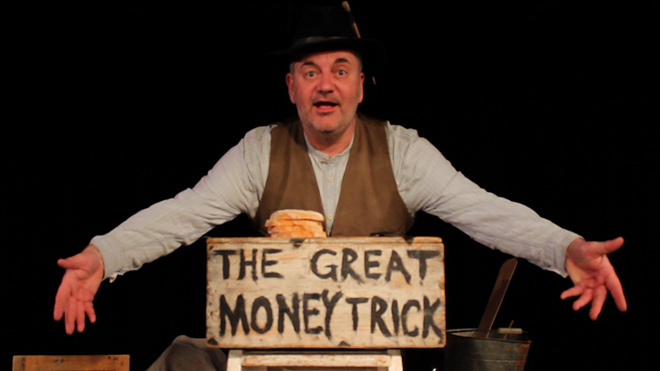 Rather a busy theatre going week last week with The Ragged Trousered Philanthropist at Bussey Building in Peckham, as part of Townsend Productions two play residency + a post show inspirational session from the author Stephen Lowe; First Lady Suite by Michael John LaChuisa given a stylish new production by Matt Ryan, Lee Newby and Nigel Lilley at Mountview; then to Oxford for Improbable Theatre’s Tempest directed by Phelim McDermott with a vibrant design by Becs Andrews and inspirational glass percussion score performed and composed by Brendan Murphy; and finally over to the Theatre Royal Stratford East for Big Time, Andrew Jarrett’s realization of a long-held dream to explore the life of Lionel Bart in music and with the play by Christopher Bond. Neil McDermott was great casting for the massive role of Lionel, and Jessica Hynes absolutely brought the extraordinary Joan Littlewood to life.
Rather a busy theatre going week last week with The Ragged Trousered Philanthropist at Bussey Building in Peckham, as part of Townsend Productions two play residency + a post show inspirational session from the author Stephen Lowe; First Lady Suite by Michael John LaChuisa given a stylish new production by Matt Ryan, Lee Newby and Nigel Lilley at Mountview; then to Oxford for Improbable Theatre’s Tempest directed by Phelim McDermott with a vibrant design by Becs Andrews and inspirational glass percussion score performed and composed by Brendan Murphy; and finally over to the Theatre Royal Stratford East for Big Time, Andrew Jarrett’s realization of a long-held dream to explore the life of Lionel Bart in music and with the play by Christopher Bond. Neil McDermott was great casting for the massive role of Lionel, and Jessica Hynes absolutely brought the extraordinary Joan Littlewood to life.
I did 11 coaching and surgery sessions with playwrights, cabaret artists, composers, choreographers, art photographer, spiritual practitioners and producers. They are a wonderful way to refresh my palette with new artistic ideas, and to keep me on my toes as I explore 11 very different worlds.
And add to that being a bystander in an amazing debate between young producer Daisy Hale, one of our cohort on the MA Creative Producing at Mountview, and legendary theatremaker David Glass. The subject, close to my heart, was what is the role (if any useful role can be determined) for the producer – especially when described as a creative producer or thinking that the producer is in some way a creative being. Two most eloquently argued opposing views offered to Facebook friends and followers, led me to invite David to come in to Mountview next week where he can meet, inspire, challenge, and provoke our MA creative – producers, directors, writers, musical directors, and production management. I sense it will be an inspiring session.
Has theatre changed since the world of the 1960s and Joan Littlewood and Lionel Bart, or the 70s and 80s with Stephen Lowe and David Glass following very different paths in the creation of new work in major houses, or the 80s to 00s when I was creating festivals and programming theatre spaces, and Phelim, Matt and all my generation were first making work. The Arts Council and local authority funding has been a part of our lives throughout this time if we worked in the subsidized houses. The search for angels and sponsors and deals has been part of the commercial arena for all that time. Maybe we all have to be more accountable than we did then. There is more form filling, and more requirement to prove we are to reaching a wider audience for our work. There is more competition for leisure time I sense there are less people with less time, money or inclination to go out to live theatre. But there have been managers and producers shaping the creative programme of theatres all that time. Some of them have been actor managers, or producers who direct, but at its heart they have followed the same path, intertwining the artistic and the financial decisions to keep trading, keep head above the waterline, keep stakeholders happy, and maybe have a run-away hit occasionally.
The four shows I saw this week, the 11 one-on-one sessions, my two days teaching, the facebook debate, and even the inspiring board meeting of The Production Exchange were all about making stuff happen. The need to make art and then “ship it out” to quote Steve Jobs. Kath and I are blessed to be working with the widest array of creatives who make, ship, and make again. Some are still studying, like the cast of First Lady Suite, some have 30+ 40+ years on the creative clock and they are still buzzing with ideas. There can’t be many other professions which, in the main, keep a level of passion and inspired creativity in most of its workforce for most of the time. No wonder David Whyte takes his poetic creativity into corporate boardrooms, my choreographic friends lead inspired yoga and meditation classes in Canary Wharf and government offices, and Kath plus so many colleagues take their directorial and playwriting skills into business to help them create, and deal with the stresses and strains of corporate life.
Maybe in time this government will see the phenomenal power of creative people, creative producers, creative directors, to make for a better world. Maybe in time young people and teachers will be allowed to spend the time on creativity that will make the world a better place. And maybe (just maybe) governments – local, national, and international – will invest in the returns that art can bring. In the meantime David, Daisy, and all those in the businesses of creative producing will keep producing work to delight, excite, challenge, heal, entertain, educate or inspire an audience. As we get older we may get grumpier, and think of the good old days, but we still make, ship it out, and make again.
